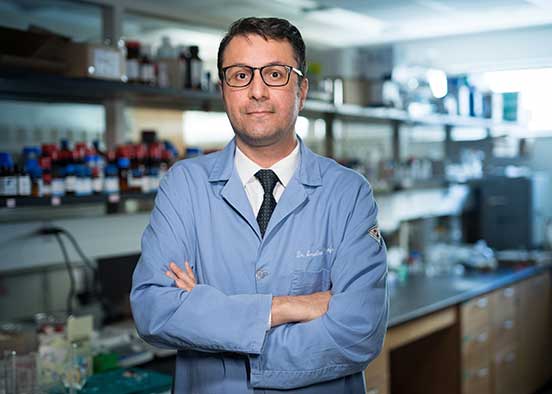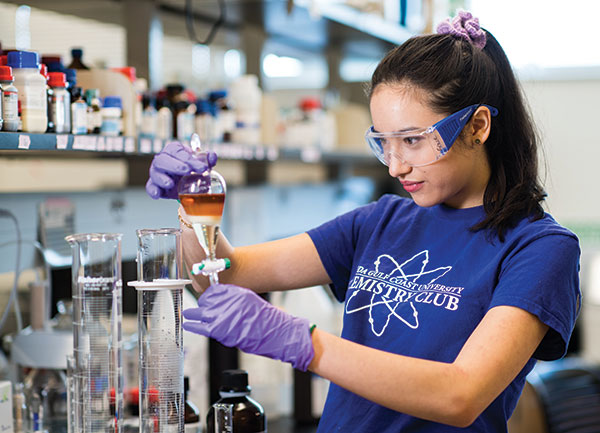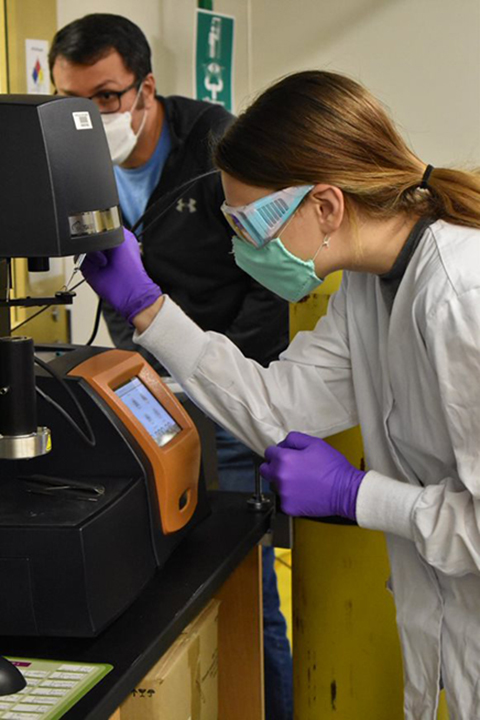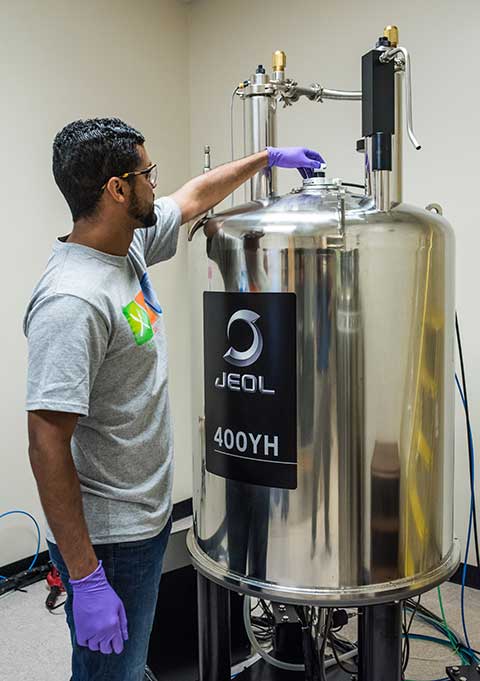
There may be no single formula for student success, but the Mirjafari Lab in Florida Gulf Coast University’s chemistry department is achieving promising results with a potent potion of undergraduate research and personalized mentorship.
The proof? Two current undergraduate researchers have been awarded highly competitive Goldwater Scholarships; one of them has had three published research papers, and also been accepted into a prestigious summer research program for undergrads. Consider, too, the growing number of former lab members who are pursuing doctoral degrees at institutions like Carnegie-Mellon University, Florida State University and the University of California, Santa Barbara.
The Mirjafari Lab, an undergraduate research group focusing on application-driven research on materials chemistry, particularly ionic liquids, is changing lives through chemistry in more ways than one. Chosen from Dr. Arsalan Mirjafari’s introductory organic chemistry classes, a number of the students were inspired to alter academic or career paths after experiencing the thrill of hands-on research and discovery of new knowledge. Some are engaged in studies that could impact areas like energy, environment or health.
“Our goal is to resolve real-world issues,” Mirjafari says. “I always tell students the purpose of science is to make the world a better place.”
It’s all part of an increasingly dynamic research environment that’s elevating FGCU’s profile in the chemistry world while benefiting individual students and professors. In fact, at most undergraduate-focused institutions, faculty research is limited by lack of lab infrastructure and the demands of teaching, Mirjafari says. His model was inspired by the University of South Alabama, a primarily undergraduate school where he did his postdoctoral research fellowship.
“To me, student success means students generating meaningful and publishable data in the lab, publishing and disseminating data, and getting into prestigious graduate schools in medicine or science. That’s not easy for an undergraduate,” says Mirjafari, 44, who joined FGCU in 2012. “From day one, my philosophy has been to generate knowledge and train the chemists of tomorrow. We need to cultivate a love of science. It’s contagious. I really try to spread that to my students.”

Some students enter his fundamental organic chemistry classes with the desire simply to get a good grade and enhance their grade-point average. Others dream of medical school and a high-paying career as a doctor. When it comes to selecting undergrads to work in his lab, Mirjafari is more interested in their passion and perseverance than their GPAs. He talks in class about his research, dropping in a little more information week by week, and by mid-semester a handful of students are interested enough to ask to work in the lab. The space is small, so he can only accept three to four undergraduate researchers each year.
“I watch to see how enthusiastic they are in class,” Mirjafari says. “I expect a lot from my students — the bar is quite high. I look for persistence. If someone gets a bad grade, do they just give up or do they try harder? As long I see them trying to scientifically grow, that’s good enough for me.”
One of Mirjafari’s first research students, Manny Sanchez Zayas (’16, Chemistry), thought taking organic chemistry would be beneficial for getting into medical school. He asked about working in the lab, but Mirjafari wanted to wait and see how he did in the course, Sanchez Zayas recalls. His performance on the first exam got him in. Along with training in the lab, the few students met before class in Mirjafari’s office, sharing tea as well as ideas on solving projects.
“It was a very tight-knit group,” Sanchez Zayas says. “It was building a culture of camaraderie. That’s the way chemistry should be done. It was very hands on. He’s a blast on a personal level – very energetic. He takes time to talk to you.”
Sanchez Zayas didn’t have a Plan B if medical school didn’t work out, but the more research he did with Mirjafari, the more intrigued he became. He’s now a Ph.D. candidate in materials chemistry (see sidebar).

Rising FGCU senior and Goldwater Scholar Grace Anderson tells a similar story. Double-majoring in biochemistry and music, she was considering pre-med but didn’t really have a clear path in mind. After more than two years working in the Mirjafari Lab, she’s now training and mentoring new students. Last summer, she was among a half-dozen students across the country accepted into an elite Massachusetts Institute of Technology (MIT) program for undergraduate research; because of the pandemic she remained in Fort Myers and conducted research on campus while also producing hand sanitizer in the lab for distribution on campus. Since then, she’s had her third chemistry research paper accepted for publication and was reinvited to the MIT program this summer. She plans to pursue a Ph.D. and integrate materials chemistry and biology/medicine research while become a professor at a research-focused university.
“He really changed my whole outlook on what I want to do as a career,” she says. “His enthusiasm is super-infectious. Working with him opened a lot of doors and helped me see my potential better. He has the philosophy of always looking for the next big thing to work on as a researcher, to not only build our base of knowledge but build it in a way where we can solve real-world challenges.”
For Anderson, that big thing turned out to be researching anti-cancer applications of ionic liquids, or liquid salts. For senior bioengineering major and Goldwater Scholar Elizabeth Recker, that big thing is climate change. In the Mirjafari Lab, she’s exploring ways to use ionic liquids for carbon capture from the atmosphere.
“Dr. Mirjafari is really here for the students,” Recker says of her favorite mentor. “He sat down with me and asked what my goals and dreams are. Since then, he has set up countless opportunities for me to reach those goals. He’s very helpful where he needs to be, but he pushes me to find the answers myself.”
To cultivate more opportunities for the generations of scientists and doctors following in Anderson and Recker’s footsteps, Mirjafari hopes to expand the lab space and acquire instrumentations to support the kind of research that attracts external federal funding. A National Science Foundation grant that allowed Mirjafari to procure a half-million dollar research-grade nuclear magnetic resonance (NMR) spectrometer in 2016 was a major turning point for FGCU, he says. It allows students hands-on experience with state-of-the-art technology used to identify unknown substances, to characterize specific arrangements of atoms within molecules, and to study the dynamics of interactions between molecules in solution. Access to such instruments is essential to chemists carrying out frontier research.
“People in the chemistry world know FGCU now,” says Mirjafari, whose involvement with the nonprofit National Academy of Sciences, Engineering and Medicine (NASEM) also is helping build awareness of the university. “With the external funding from federal agencies, it took a lot of effort to get there, to convince the Program Officers to trust my team and trust FGCU. We are publishing high-quality publications in prestigious journals. Our two Goldwater Scholarships were the product of eight years of constant trying and learning. Achievements like these are putting FGCU on the map in the academic world, showing them we really do science here.”[/vc_column_text][vc_column_text]
WHERE ARE THEY NOW?
Taha Hmissa (’19, Chemistry)
Hmissa, who just finished his first year at Florida State University College of Medicine, started training in the Mirjafari Lab as a freshman while taking his second organic chemistry class with Dr. Mirjafari. His research experience and publications as an undergraduate were “the main topic of conversation” when he was applying to medical schools, he says.
“Dr. Mirjafari is known to treat his undergraduate students as if they’re in a Ph.D. program. You get the autonomy that is required for innovation and sparking ideas, although he won’t tolerate a lack of worth ethic and is in constant demand of data that is publishable. This work ethic that he instills in you prepares you for graduate-level programs that have even more demanding faculty — and beyond.”
Melissa Reardon (’17, Biology with Chemistry Minor)
A third-year chemistry Ph.D. candidate at the University of Texas at Arlington, Reardon studies medicinal chemistry, specifically the synthesis and early screening of potential new anti-cancer agents. Taking Mirjafari’s organic chemistry course was just a step toward her lifelong dream of veterinary medicine, she thought when she was an undergrad. His passion for chemistry and teaching inspired her.
“He wants to help you succeed in every way possible. Imagine the impact he must have made to have me completely change my career and passions into becoming a chemist! The hands-on experience working in his lab made me realize my love for the chemistry field.”
Manny Sanchez Zayas (’16, Chemistry)
A Ph.D. candidate in materials chemistry at the University of California, Santa Barbara, Sanchez Zayas says the hands-on research experience he had at FGCU shaped his path toward graduate school and beyond. Due to complete his doctorate in July, he already has accepted a position with an international chemical company based in Germany.
“Being able to work with Dr. Mirjafari and publishing in periodicals as an undergrad was a huge factor on my resume. He told me once, ‘You know what I love about this? The ability to create knowledge. Doing something nobody has done before – that’s the exciting part.’”
